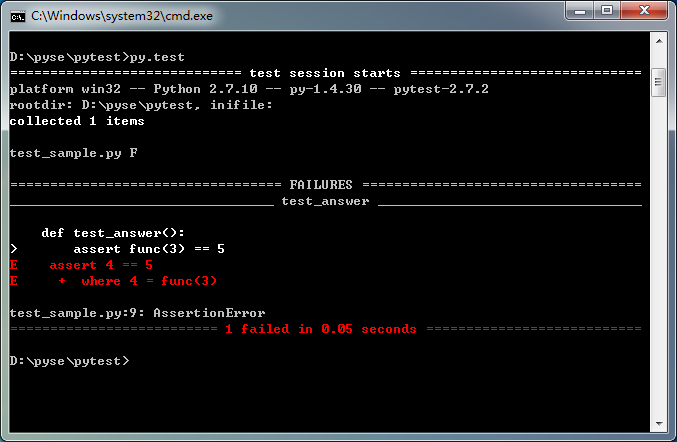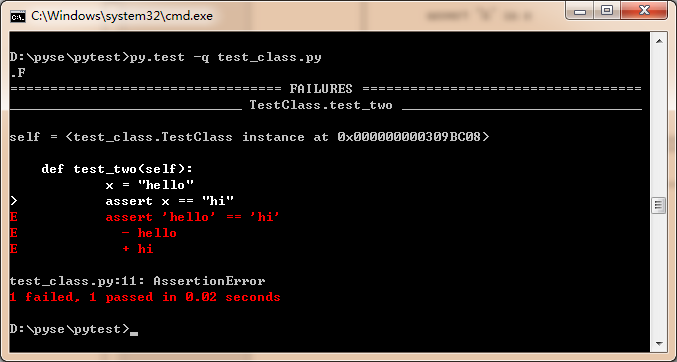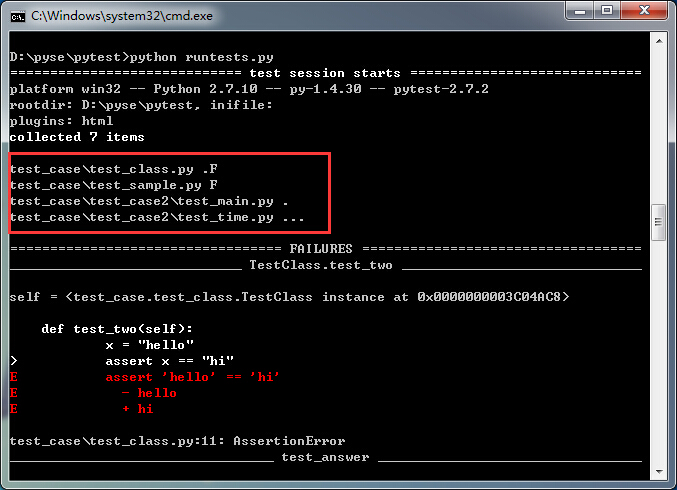Python单元测试框架之pytest---如何执行测试用例
2015-08-27 23:23 虫师 阅读(86488) 评论(7) 收藏 举报
介绍
pytest是一个成熟的全功能的Python测试工具,可以帮助你写出更好的程序。
适合从简单的单元到复杂的功能测试
- l 模块化parametrizeable装置(在2.3,持续改进)
- l 参数化测试函数(用例)
- l 标记测试功能与属性
- l Skip和xfail:处理不成功的测试用例(在2.4改进)
- l 通过xdist插件分发测试到多个CPU
- l 不断地重新运行失败的测试
- l 灵活约定的Python测试发现
Home Page: http://pytest.org
安装
>pip install -U pytest # 通过pip安装
>py.test --version # 查看pytest版本
This is pytest version 2.7.2, imported from C:\Python27\lib\site-packages\pytest.pyc
简单的测试
让我们创建第一个文件,对个简单的功能进行测试。
#coding=utf-8
# 功能
def func(x):
return x + 1
# 测试用例
def test_answer():
assert func(3) == 5
切换到测试文件所在的目录,通过“py.test”命令运行测试。
>py.test
执行结果如下图:

===================================================================
在一个测试类中创建多个测试用例:
#coding=utf-8
class TestClass:
def test_one(self):
x = "this"
assert "h" in x
def test_two(self):
x = "hello"
assert x == "hi"
运行测试:
>py.test -q test_class.py

-q 为quiet。表示在安静的模式输出报告诉。加不加这个参有什么区别呢? 读者可以对比一下两次输出的日志。其实,就是少了一些pytest的版本信息。
===================================================================
从Python代码中调用pytest
pytest中同样提供了main() 来函数来执行测试用例。
pytest/
├── test_sample.py
├── test_class.py
└── test_main.py
此目录为我们练习的目录,打开test_mian.py
import pytest
def test_main():
assert 5 != 5
if __name__ == '__main__':
pytest.main()
直接运行该程序,sublime 中按Ctrl+B 运行。结果如下:
============================= test session starts =============================
platform win32 -- Python 2.7.10 -- py-1.4.30 -- pytest-2.7.2
rootdir: D:\pyse\pytest, inifile:
collected 4 items
test_class.py .F
test_main.py F
test_sample.py F
================================== FAILURES ===================================
_____________________________ TestClass.test_two ______________________________
self = <test_class.TestClass instance at 0x000000000304F548>
def test_two(self):
x = "hello"
> assert x == "hi"
E assert 'hello' == 'hi'
E - hello
E + hi
test_class.py:11: AssertionError
__________________________________ test_main __________________________________
def test_main():
> assert 5 != 5
E assert 5 != 5
test_main.py:4: AssertionError
_________________________________ test_answer _________________________________
def test_answer():
> assert func(3) == 5
E assert 4 == 5
E + where 4 = func(3)
test_sample.py:9: AssertionError
===================== 3 failed, 1 passed in 0.03 seconds ======================
[Finished in 0.3s]
从执行结果看到,main() 默认执行了当前文件所在的目录下的所有测试文件。
那么,如果我们只想运行某个测试文件呢?可以向main()中添加参数,就像在cmd命令提示符下面一样:
#coding=utf-8
import pytest
def test_main():
assert 5 != 5
if __name__ == '__main__':
pytest.main("-q test_main.py") # 指定测试文件
运行结果:
F
================================== FAILURES ===================================
__________________________________ test_main __________________________________
def test_main():
> assert 5 != 5
E assert 5 != 5
test_main.py:4: AssertionError
1 failed in 0.01 seconds
那如果我想运行某个目录下的测试用例呢?指定测试目录即可。
#coding=utf-8
import pytest
def test_main():
assert 5 != 5
if __name__ == '__main__':
pytest.main("d:/pyse/pytest/") # 指定测试目录
创建运行测试脚本
有时候我们的测试用例文件分散在不同的层级目录下,通过命令行的方式运行测试显示不太方便,如何编写一个运行所有测试用例的脚本呢? pytest可以自动帮我们生成这样的脚本。
>py.test --genscript=runtests.py

打开生成的测runtests.py文件:
sources = """
eNrsve2S3EiSIDa3+jhtnvZ293Ra6SSdCZMUF0AzK1nk9OzM1nV2L4dNznKnm6TxY6dX1XVJVAJV
halMIAkgWVU3O2d6Ar3CPYQeQn/1QjKTf8UnAplZ7O6ZPTNxpiszgQiPCA8PD3cPD/f/449+9/5H
yds/W99M58v6fDqfl1XZzefv/9nbvxuPxxE8Oy+r8+jRy2dREq+bOt8siqaNo6zKo3hRV+1mRb/h
a1UsuiKPPpRZdFncXNVN3qYRABmN3v/R23+OLbRd/v6/ePOf/tmPflSu1nXTRe1NOxotllnbRq+7
PKlPfwMw0qNR
……
"""
import sys
import base64
import zlib
class DictImporter(object):
def __init__(self, sources):
self.sources = sources
def find_module(self, fullname, path=None):
if fullname == "argparse" and sys.version_info >= (2,7):
# we were generated with <python2.7 (which pulls in argparse)
# but we are running now on a stdlib which has it, so use that.
return None
if fullname in self.sources:
return self
if fullname + '.__init__' in self.sources:
return self
return None
def load_module(self, fullname):
# print "load_module:", fullname
from types import ModuleType
try:
s = self.sources[fullname]
is_pkg = False
except KeyError:
s = self.sources[fullname + '.__init__']
is_pkg = True
co = compile(s, fullname, 'exec')
module = sys.modules.setdefault(fullname, ModuleType(fullname))
module.__file__ = "%s/%s" % (__file__, fullname)
module.__loader__ = self
if is_pkg:
module.__path__ = [fullname]
do_exec(co, module.__dict__) # noqa
return sys.modules[fullname]
def get_source(self, name):
res = self.sources.get(name)
if res is None:
res = self.sources.get(name + '.__init__')
return res
if __name__ == "__main__":
if sys.version_info >= (3, 0):
exec("def do_exec(co, loc): exec(co, loc)\n")
import pickle
sources = sources.encode("ascii") # ensure bytes
sources = pickle.loads(zlib.decompress(base64.decodebytes(sources)))
else:
import cPickle as pickle
exec("def do_exec(co, loc): exec co in loc\n")
sources = pickle.loads(zlib.decompress(base64.decodestring(sources)))
importer = DictImporter(sources)
sys.meta_path.insert(0, importer)
entry = "import pytest; raise SystemExit(pytest.cmdline.main())"
do_exec(entry, locals()) # noqa
好吧!其实, 我也不理解这段代码的含义,但是执行它的可运行测试用例了。
pytest/
├── test_case/
│ ├── test_sample.py
│ ├── test_class.py
│ ├── __init__.py
│ └── test_case2/
│ ├── test_main.py
│ ├── test_time.py
│ └── __init__.py
└── runtests.py
执行runtest.py文件。
>python runtest.py

当然,你也可以打开runtests.py 文件运行它。
===================================================================
* 最后,pytest是如果识别测试用例的呢?它默认使用检查以test_ *.py 或*_test.py命名的文件名,在文件内部查找以test_打头的方法或函数,并执行它们。
pytest还有许多需要讨论的地方,做为这个系列的第一节,先介绍到这里。

 浙公网安备 33010602011771号
浙公网安备 33010602011771号